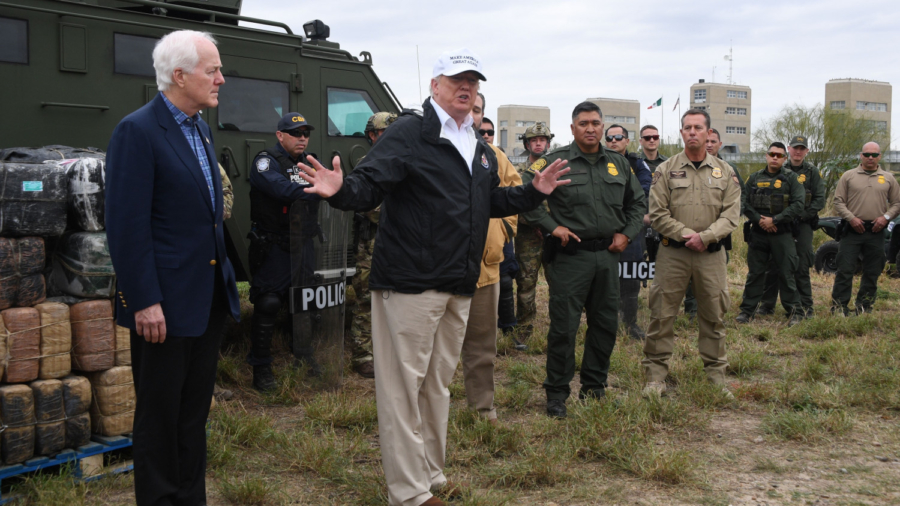President Donald Trump has many times promised that Mexico will pay for his signature campaign promise—a wall along the southern border.
Since taking the office, he’s been pressing Congress to appropriate money for the wall, eventually reaching an impasse with Democrat lawmakers that resulted in a partial government shutdown that has continued for weeks.
Since December, Trump has been saying he’s already delivered on his promise and that Mexico is already paying for the wall through a rebalancing of trade stemming from the United States-Mexico-Canada Agreement negotiated earlier in 2018.
“I often stated, ‘One way or the other, Mexico is going to pay for the Wall,’” Trump said in a Dec. 13 tweet. “This has never changed. Our new deal with Mexico (and Canada), the USMCA, is so much better than the old, very costly & anti-USA NAFTA deal, that just by the money we save, MEXICO IS PAYING FOR THE WALL!”
On Jan. 10 he clarified: “Obviously, I never said this and I never meant they’re going to write out a check. I said they’re going to pay for it. They are. They are paying for it with the incredible deal we made.”
The deal, not yet ratified by Congress, takes back some trade advantage from Mexico, including a requirement that car manufacturers have to use more U.S.-made parts. Such an adjustment could be expected to produce a tax revenue gain for the United States and a tax revenue loss for Mexico, giving Trump the basis for saying that Mexico is paying for the wall.
This justification is also consistent with what Trump promised voters.
Check or Trade
In his campaign materials, Trump outlined several options of how to make Mexico pay for the wall, some of which included the option for Mexico to write a check, such as his threat to impound remittances to Mexico from illegal immigrants.
“It’s an easy decision for Mexico: make a one-time payment of $5-10 billion [toward the wall construction] to ensure that $24 billion [in remittances from Mexican nationals working in the United States] continues to flow into their country year after year,” his campaign document reads (pdf).
But he didn’t say this was definitely the way Mexico would pay.
The document listed three more options for how to compel the southern neighbor to pay: Threatening to cancel visas for Mexicans, increasing visa fees, and renegotiating trade.
“There is no doubt that Mexico is engaging in unfair subsidy behavior that has eliminated thousands of U.S. jobs, and which we are obligated to respond to,” the document reads. “The impact of any tariffs on the price imports will be more than offset by the economic and income gains of increased production in the United States, in addition to revenue from any tariffs themselves. Mexico needs access to our markets much more than the reverse, so we have all the leverage and will win the negotiation.”
The document didn’t make it clear if the tariff threat was supposed to prompt Mexico to write a check for the wall or whether a more balanced trade itself would be satisfactory for Trump.
But on the campaign trail, Trump elaborated further, suggesting he would settle for trade concessions.
“You don’t expect that [the Mexican President is] going to write a check, but what you’re saying is that they will have to make concessions,” Fox News’ Sean Hannity said, interviewing Trump during a town hall in North Carolina on March 9, 2016.
“Well, there’s many different ways. Yea,” Trump responded.
“You don’t expect Mexico to say, ‘Yes Mr. Trump, here’s a check for $10 billion?’” Hannity asked.
“No. No. Because politically it’s not feasible. It would not look good,” Trump replied.
“You think that the deals that you make will more than compensate for the wall?” Hannity continued.
“Yea. Even if we tax them. We may tax them, ok?” Trump said. “It doesn’t make any difference.”
He wouldn’t take the check option off the table completely, though.
A month later in Pittsburg, Hannity probed Trump on the issue again.
“They’re not going to write us a check,” Hannity said.
“They’ll pay,” Trump responded. “They’ll pay. In one form or another. They may even write us a check by the time they see what happened.”
Dealmaking
Trump has been vocal about his ability to negotiate a deal—playing a strong hand, but leaving a door open to a compromise.
“I’m ok to making a compromise,” he commented on Jan. 10 on his wall-funding negotiations with the Democrats. “Compromise is in my vocabulary, very strongly.”
He also made it clear he’s not one to pass on leverage.
“Remember the principal strategy of negotiation: The side that needs the deal the most is the one that should walk away with the least,” he said in his 2015 book “Crippled America: How to Make America Great Again.”
He further summed up his business approach in the book: “I think big. I aim very high, and then I keep pushing and pushing toward that goal—and beyond it. In the end I may not get everything I want—I understand that—but I never compromise on the basic goals I set out for.”
From The Epoch Times


